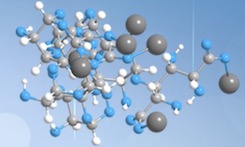
















a caretaker at beijing intech nursing home, a private facility, looks after an alzheimer's patient in march 2011. [feng yongbin / china daily]
gv-971, a multi-targeting oligosaccharide drug developed by a chinese research group, could give alzheimer patients hope, lead researcher geng meiyu told xinhua on thursday.
"if everything is confirmed in future studies, this can really give the world new hope," she said.
geng, key inventor of the gv-971, presented the findings in a speech on thursday at the 11th clinical trials on alzheimer's disease conference (ctad) being held in barcelona until oct. 27.
alzheimer's disease is an irreversible, progressive brain disorder that slowly destroys memory, thinking skills, and the ability to carry out simple tasks. the disease affects about 48 million people worldwide, and the number is expected to increase with the aging population. there is no effective cure.
gv-971 was developed by ocean university of china, shanghai institute of materia medica under chinese academy of sciences and green valley pharmaceutical co., ltd, after a 21-year study.
the drug completed phase 3 clinical trial in july this year. a phase three clinical trial is the last test before reaching the market.
in the trial, participants took 450 mg gv-971 orally twice a day for 36 weeks, which proved effective in improving cognition.
extracted from brown algae, the drug is targeted at patients with mild-to-moderate alzheimer's. independent animal experiments also showed that it can regulate the immune system, reduce neuro-inflammation and improve cognition.
"in the future we will confirm our findings in human bodies," geng said. the launch of a new drug like gv-971 would give hopes to patients not only in china but in other parts of the world, she added.
full story here


